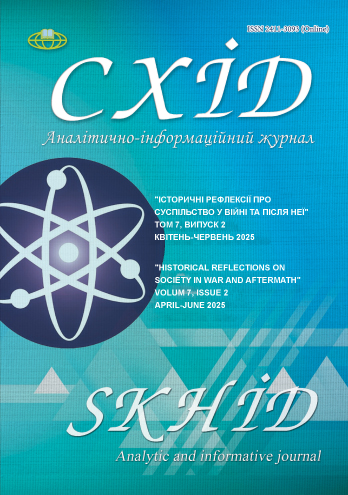Transformation of understanding of justice in the context of the problem of social equality: a philosophical analysis
DOI:
https://doi.org/10.21847/2411-3093.2025.722Keywords:
egalitarian justice, distributive justice, procedural justice, arithmetic equality, geometric equality, paradigm, courage, just warAbstract
The article is devoted to the analysis of the category of “justice” through the prism of the problem of social equality. It is noted that in the pre-modern naturalistic paradigm of philosophizing, where the main narratives were the correspondence of the social order to the eternal natural law, justice was associated with inequality and the principle of hierar-chy. Moreover, just hierarchy concerned both the internal spiritual qualities of the person himself, where reason should rule over passions, and the gender-social organization of society, where a man is superior to a woman, a Greek is superior to a barbarian, and so on. Within the framework of this naturalistic paradigm Plato`s and Aristotle’s approving attitude towards slavery should be understood, because from their point of view the soul itself can be slavish and cowardly by nature or, conversely, brave and freedom-loving. In the medieval paradigm of philosophizing, the conceptual connection of jus-tice-inequality is preserved; however, philosophers appeal more to divine law and divine justice. It is noted that in this epoch did emerge the concept of a “just war” as a sacred moral duty to protect the innocent. This concept of a just war remains relevant to this day, in Ukrainian military realities. In the era of the Enlightenment, with the advent of the new European paradigm of philosophizing, where the emphasis is on the rational subject and his will to power, justice began to be understood precisely as equality, as evi-denced by the philosophical tradition begun by I. Kant and continued in the twentieth century in the theories of justice of J. Rawls and J. Habermas.
Downloads
References
Arendt, H. (1958). Human condition. Yale university press.
Aristotle (1991). Selected works. Peripatetic press.
Caner, E. M. (2003). Bellum Sacrum: The Development of the Holy War of the First Crusade in Light of Au-gustine's Just War Criteria. University of South Africa.
Childress, J. (2018). Just-War Theories: The Bases, Interrelations, Priorities, and Functions of Their Crite-ria. Theological studies, 39 (3). Kennedy institute. Georgetown university. https://doi.org/10.1177/00-4056397803900302
Fultner, B. (ed.), (2011). Jürgen Habermas: Key Concepts. Durham: Acumen.
Habermas, J. (2019). Post-Metaphysical Thinking II. Polity Press, Cambridge.
Kant, I. (2012). Groundwork of the Metaphysics of Morals. 2nd Edition. Cambridge Texts in the History of Philosophy. Cambridge university press.
Kant, I. (2016). Observations on the feeling of the beauti-ful and sublime and other writings. Cambridge uni-versity press.
Levkulych, V. (2009). Justice in the Concepts of Ancient Thinkers. Scientific Bulletin of Uzhgorod University: Series: Political Science. Sociology. Philosophy, Issue 12. Р. 33–36 (in Ukrainian).
Morozov, A., Shapovalov, V., Hudkov, S. (2024). Onto-logical foundations of moral culture. Part II. Ukrainian cultural studies, 1 (14), 40–53 https://doi.org/10.17721/UCS.2024.1(14).08 (in Ukrai¬nian).
Plato (2001). Selected Dialogues of Plato. Benjamin Jowett (Translator). Hayden Pelliccia (Introduction). Modern library.
Rawls, J. (1971). A Theory of Justice. Belknap Press.
Strauss, L. (1989). Introduction to Political Philosophy.Tenessays. Wayne university press.
Trubnikov V., Skakun O. (2015). The principle of justice from the position of philosophy. Bulletin of the Kharkiv National University named after V. Karazin, No. 20, 13-20 (in Ukrainian).
Downloads
Published
How to Cite
Issue
Section
License
Copyright (c) 2025 Максим Бірюк

This work is licensed under a Creative Commons Attribution-NonCommercial-NoDerivatives 4.0 International License.
1. Authors bear responsibility for the accuracy of facts, quotations, numbers and names used.
2. Manuscripts are not sent back.
3. The publisher does not always agree with the authors' opinion.
4. The authors reserve the right to authorship of the work and pass the first publication right of this work to the journal under the terms of a Creative Commons Attribution-NonCommercial-NoDerivatives 4.0 International License. This license allows others to distribute (copy) the published work for non-commercial purposes, provided there is mandatory attribution to its authors and a link to the first publication in our journal.
5. The authors have the right to conclude separate supplement agreements that relate to non-exclusive work distribution in the form in which it has been published by the journal (for example, to upload the work to the online storage of the journal or publish it as part of a monograph), provided that the reference to the first publication of the work in this journal is included.

